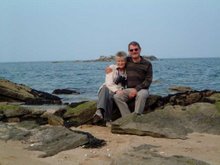Next morning, Tuesday 16th October. We move campsites in a few minutes. Cruise America say they are working on our leak problem, can maybe arrange a swap at their San Antonio depot. We say we’ll go to Kerrville via San Antonio, so please have one ready. Let’s push them along. We arrive San Antonio depot at 1:00pm. The manager there says he JUST received a call from the Assistance desk, but he does in fact have a spare motorhome, old and grubby, but weatherproof. Yes, we’ll take it.
Now rainproof in Kerrville, the next day we visit a local attraction: LBJ’s ranch. You wonder- who was LBJ?
Lyndon B Johnson was the 36th President of the USA. This is his most iconic photo, being sworn in as President on the day of Kennedy’s assassination. Johnson, as vice-president, automatically took over. Jackie Kennedy is standing alongside.
Johnson’s family
story is interesting. His grandparent came as settlers in the 1850’s and
started out in this “dog trot” cabin. It is so named because a dog could trot
through the empty space between the two sections. One part was living quarters,
the other for sleeping, and the separating space a working or even sleeping
area in hot weather.
The Comanche tribes
were a frequent threat, understandably, because, they were being driven off
their lands. LBJ’s grandmother hid in the crawlspace under the cabin with her
daughter whilst they plundered the cabin on one occasion. They’re not looking
happy in the photo, so let’s hope they didn’t scalp the photographer.
Granddad made a
fortune organising 4 cattle drives from 1867 to 1870, then lost it all when the
market collapsed. Cattle thrived in this area, called the Hill Country, with
the lush, tall grass as in the next photo.
Me there for scale. It misled the early settlers into thinking it was
rich soil. However, it was thin and poor for crops and only suitable for
grazing.
LBJ was born in
1908 in this a dog trot cabin a few miles away from his grandparents dog trot
home. The family photo shows the cabin at the back. It’s worth looking at some
of the formally posed characters, particularly the two ladies who appear to be
bound together with barbed wire.
LBJ’s schoolroom
also takes a good photo, particularly the heating system: a wood stove with a
long hot pipe. LBJ himself taught for a time in a poor Hispanic area and this fired
his political aim to provide a good education for all children. His many
education reforms substantially achieved this, the most significant of which
was signed into law outside this very schoolroom in the presence of his
original teacher!
The LBJ family
moved to Johnson City, named after a relation, 15 miles away. His parents were
comfortably well off and involved in politics inspired young Lyndon’s political
ambitions. He gave his first speech from the veranda of the home. He addressed
an invited audience rather haranguing, bible-puncher style, the few passers-by from
the local farming community.
Following political
success by election to the US Senate in 1948, LBJ bought his aunt’s run-down
ranch estate in 1951, which also included the house he was born in a few photos
above. He steadily improved it so it become known as the Texas White House
during his Presidency, but even then it was more a large family home than a
grand mansion.
An airstrip was
built on the ranch that could accommodate executive size jets but nothing as
large as the Air Force Ones of other Presidents. In fact, he would refer to his
small aircraft as Air Force One-Half.
Inside, the plane
was modestly furnished and rather cramped.
The most bizarre
vehicle used for transporting guests was LBJ’s fire engine. This was a gift
from a town in Texas, being out of date for regular use.
So much for the
trappings of LBJ’s office. As person he could be crude, aggressive and
domineering. His was not an endearing personality, but in his 5 years of office
he signed more bills into legislation than any other President: over 1,000. He
made into law bills on civil rights, education, environmental protection, gun
control and social security, including Medicare and Medicaid. He truly believed
in equality of opportunity.
The downside of his
term was the escalation of the Vietnam War, but that was an unwinnable situation
for any President. Without the war his even more ambitious plans for a fair,
just and equal society might have been realised. He really was a great
President, an unsung hero, and perhaps heroes can’t always afford to be nice
people.













No comments:
Post a Comment